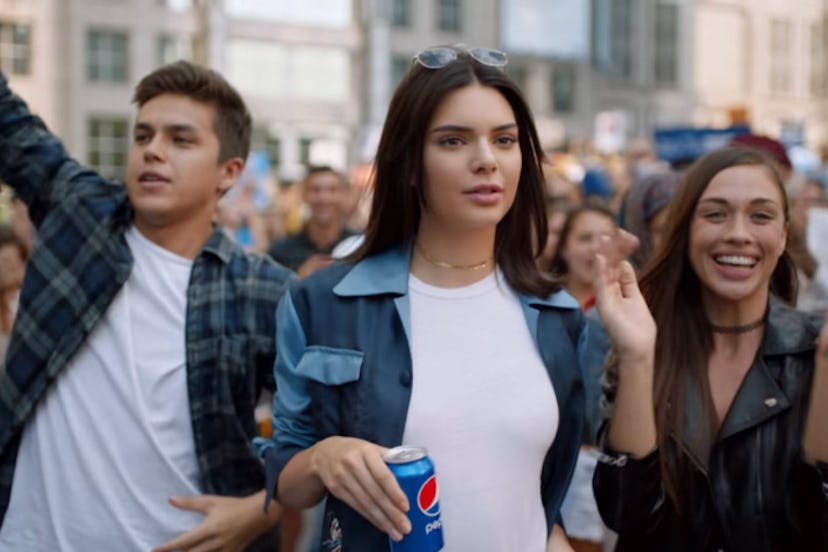Pepsi Pulls Controversial Kendall Jenner Ad

Just one day after releasing a new ad featuring Kendall Jenner, Pepsi pulled the commercial on Wednesday and issued an apology amid a backlash accusing the company of making light of issues surrounding the Black Lives Matter movement and police brutality.
“Pepsi was trying to project a global message of unity, peace and understanding,” Pepsi said in a statement. “Clearly we missed the mark, and we apologize. We did not intend to make light of any serious issue. We are removing the content and halting any further rollout. We also apologize for putting Kendall Jenner in this position.”
The ad, officially titled “Live for Now Moments Anthem,” was removed from the company’s official YouTube channel, though it remains online via other accounts. Jenner has yet to respond to the controversy. Posts about the campaign were removed from both the social media feeds of Jenner and her mother Kris Jenner.
In the commercial, Jenner is shown participating in a photo shoot when a crowd of protesters marching for an unnamed cause passes by. They carry signs with vague statements such as “join the conversation,” and all appear to be in a jovial mood. Jenner eventually descends from her shoot, tossing off her blond wig, to join the group after one marcher seems to encourage her with a nod, and then the model swiftly makes peace between police donning riot gear and marchers by handing a police officer a can of Pepsi. The video incited a major backlash from many who took to Twitter to rip the spot, labeling it as tone deaf, disrespectful, and tasteless.
Initially, however, Pepsi stood by the ad. “The creative showcases a moment of unity, and a point where multiple story lines converge in the final advert,” a Pepsi spokesperson told Teen Vogue. “It depicts various groups of people embracing a spontaneous moment, and showcasing Pepsi’s brand rallying cry to ‘Live for Now,’ in an exploration of what that truly means to live life unbounded, unfiltered, and uninhibited.”
Related: Kim Kardashian Is Pat McGrath’s Newest Muse
A Brief History of Fashion’s Most NSFW, Controversial Ad Campaigns
For their first large-scale campaign, the designers behind Eckhaus Latta enlisted a diverse group of 30-something couples to not only wear their spring 2017 collection, but have real sex in front of the camera for the photographer Heji Shin, who had produced a similar series of images for a German sex education book for teenagers.
In 1971, a nude (and largely hairless) Yves Saint Laurent posed nude for Jeanloup Sieff to debut his first-ever perfume for his namesake label, Pour Homme.
Other than her controversially “heroin chic” ads for Calvin Klein, a topless, 17-year-old Kate Moss also starred in this 1992 campaign for the brand with Mark Wahlberg—one that made her so uncomfortable, she later said it prompted a nervous breakdown.
Rumor has it that Wonderbra’s billboards of Eva Herzigova caused traffic build-ups and car crashes when they went up in 1994.
It didn’t take long for controversy to erupt after Steven Meisel and Calvin Klein cast a crew of apparently underage models, including Kate Moss, for a 1995 Calvin Klein campaign; eventually, CK responded to the outcry over the ad with another ad, a full page in the New York Times announcing it was pulling the original advertisement.
This infamous 2000 campaign from Yves Saint Laurent, featuring a nude Sophie Dahl, drew 948 complaints to the U.K.’s Advertising Standards Authority, making it the eighth most complained about advertisement in recorded history.
Yves Saint Laurent again pared things down for one of his perfume ads in 2002, this time swapping out the designer’s likeness for a chiseled model to go full frontal.
Tom Ford and Carine Roitfeld both solidified their reputations as provocateurs when the designer and stylist drove down the fact that they were working for Gucci by shaving a “G” into a model’s pubic hair for this 2003 campaign shot by Mario Testino.
American Apparel, whose founder Dov Charney has faced a litany of sexual harassment lawsuits, began its run of controversial ads depicting highly sexualized and barely clothed women—an approach that was highly successful in creating conversation, but hardly saved the brand from bankruptcy—with this 2006 campaign.
The concept of “sex sells” barely gets more explicit than in Terry Richardson’s 2007 campaign for Tom Ford’s men’s fragrance, an ad that was banned in Italy.
“Stupid is as stupid done” is how some critics responded to Diesel’s 2010 “Be Stupid” campaign, which featured images of models flashing security cameras, among other suggestive poses. Some felt the images were needlessly sensationalistic while others described them as youthful and rebellious.
Dakota Fanning’s 2011 campaign for Marc Jacobs’ Lola campaign was banned in England after the U.K.’s Advertising Standards Authority deemed it too “sexually provocative” for the then 17-year-old actress, who was photographed by Juergen Teller.
Thanks to a little Photoshop, Barack Obama and Hugo Chavez were just several of the world leaders found making out in a 2011 campaign by United Colors of Benneton, which has a long history of provoking with their ads.
The model Anna Ewers has long been one of Alexander Wang’s muses, but the pair ended up in hot water with this 2014 campaign, in which Ewers is only just barely wearing Wang’s clothes.
This 2007 campaign by Dolce & Gabbana’s came to be known as the “gang rape advert” not only then, when several magazines refused to run it, but when it resurfaced online in 2015.
The U.K.’s Advertising Standards Agency also banned this 2015 Miu Miu campaign, shot by Steven Meisel, for being “irresponsible” in sexualizing an apparently underage (but actually 22-year-old) Mia Goth.
Calvin Klein courted controversy again last year with a campaign that featured a model photographed from under her dress, but the acclaimed British female photographer Harley Weir, whose work has long been interested in youth culture and sexuality, defended the campaign.
Getting Candid with Kendall Jenner: